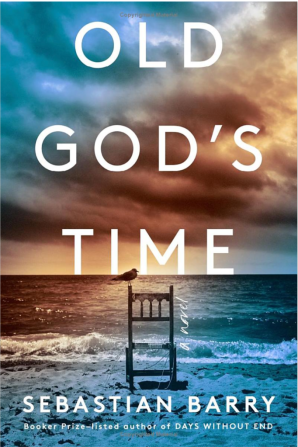‘Old God’s Time’ by Sebastian Barry
Memory, Grief, and Long Forgotten Secrets Play Out in the Latest Novel From the Two-Time Booker Prize Finalist Author

Were it almost any author but Sebastian Barry, the slow unwinding of the first 115 pages of this 260-page novel might be enough to dissuade a reader from plugging on. Yes, Barry writes a stream-of-consciousness narrative that would make Joyce proud, but being immersed chapter after chapter after chapter in the mind of a man who, at the very least, is suffering from early dementia, requires some stamina.
Granted, the opening pages offer an intriguing premise. Tom Kettle, a recently retired policeman living in the Dublin suburb of Dalkey, receives a mysterious visit from two Dublin detectives. Wilson and O’Casey ask Tom to come down to his old nick to consult on a case involving that staple of Irish life and literature, the molesting priest. The novel seems ready for liftoff, but it isn’t until Chapter Eight that Tom finally manages to make the ten-mile journey into town to meet with the detectives.
In the meantime, through flashbacks and fantasies, we learn a lot about the protagonist. Tom is an orphan who was raised in a violent and sexually abusive Catholic institution for unwanted children, as was his beloved late wife, June. Together, the couple swore they would protect their own two children, Winnie and Joseph, and they do seem to have been model parents, the opposite of the “villains” who did everything possible to suck the life and spirit from the young people in their care. As a cop, Tom was steady and meticulous, but never promoted above Detective Sergeant, and we sense that some further but as yet unrevealed trauma accounts for his relative lack of ambition and the dreamy, often careless way he now lives his life.
Although the final half of the book continues to take place mostly in the past and mostly in Tom’s mind, once we learn the true nature of the case Wilson and O’Casey are investigating, the narrative begins moving forward with unstoppable momentum. As Tom’s secrets come spilling out, the full weight this humble man has been carrying his entire life becomes clear. Unfortunately for his former colleagues, Tom’s confessions and revelations are entirely internal.
Indeed, Tom moves in and out of reality so frequently we can’t help but wonder how reliable his memories are, especially after the passage of decades. As he muses: “Enough time goes by and it is as if old things never happened. Things once fresh, immediate, terrible, receding away into old God’s time, like the walkers walking so far along Killiney Strand that, as you watch them, there is a moment when they are only a black speck, and then they’re gone.”
Time and memory continually intersect in the novel, and one unexpected result is the appearance of ghosts, which only Tom can see. Like him, they bear the scars of violence and betrayal, and while his ability to help them is minimal, they, like the dead people in The Sixth Sense, appear to find some relief in unburdening themselves to someone who can witness on their behalf.
Barry’s fictional worlds are grim overall, and Old God’s Time is no different, but for all the misery he has endured, Tom “has also been given immeasurable happiness.” His love for his wife and children are Tom’s primary joys, but his policeman’s knack for noticing small things has given him the ability appreciate everything from “the nicely engraved glasses” from which he and an acquaintance sip whiskey to the “blessed heat” and “tasty smoke” of the cigarillos he favors to the blooming flowers in his landlord’s garden and the cormorants perched across the water on Dalkey Island. Despite the omnipresence of evil, Tom is besotted by the “strange privilege” of being alive, the “lovely wildness of it.”
This review originally appeared in the California Review of Books.




You must be logged in to post a comment.